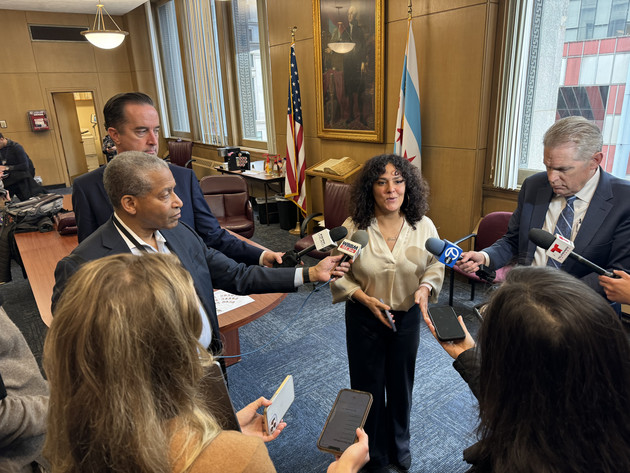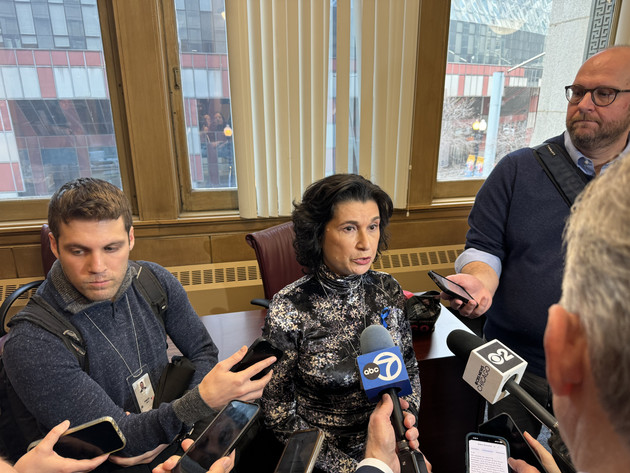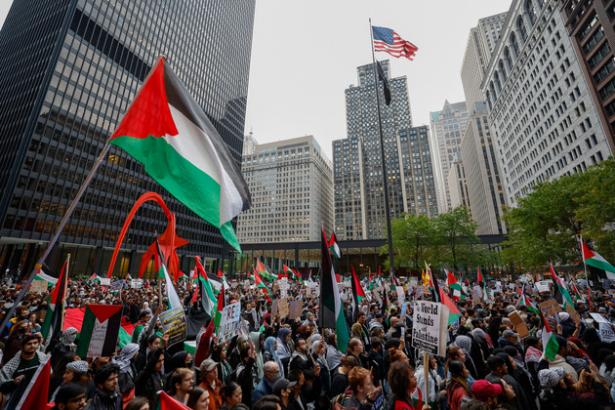Ceasefire Vote Narrowly Passes Chicago City Council, Revealing Deep Divisions Among Democrats
CHICAGO — The Chicago City Council approved a pro-ceasefire resolution in dramatic fashion on Wednesday, underscoring that the Israel-Hamas conflict is still causing deep divisions in the Democratic party.
The vote, which was delayed by an hour due to disruptions from protesters supporting the resolution, was so close that Mayor Brandon Johnson had to break the tie in favor of the measure. Its passage made Chicago the largest city in the country to call for an end to the conflict.
The resolution was non-binding, but the rancorous meeting reveals that the war in Gaza remains a fissure among Democrats — and one that’s unlikely to abate as the election year gets underway. Detroit, San Francisco and Atlanta city councils have also approved ceasefire resolutions.
Alderperson Debra Silverstein, who is the only Jewish member of the council, criticized the resolution’s supporters for going against Biden’s foreign policy strategy, especially ahead of the convention coming to Chicago.
“Chicago, America’s third-largest city, should not vote to strip away President Biden’s control over U.S. foreign policy, especially not as we are inviting him here for the Democratic National Convention,” she said.
Biden himself has been shouted down by pro-Palestinian protesters at unrelated campaign events in recent months, and was dogged by pro-Palestinian protesters in Chicago recently.
Chicago and the surrounding Cook County area are home to the largest Palestinian population in the country and the nearby Bridgeview community is known as Little Palestine. The Chicago area is also home to a large Jewish population. That combined, has added to Chicago being a hotbed of tension over the Middle East.
Supporters of the ceasefire see it as an important message to Biden ahead of the November election from a Democratic stronghold, imploring him to pivot on the issue. He initially backed Israel’s fight-fire-with-fire strategy, even if some of his language has softened recently toward the Palestinians’ humanitarian crisis.

Chicago Alderperson Rossana Rodríguez-Sánchez, a co-sponsor of the cease-fire resolution, told reporters she’s “proud” of the vote. | Shia Kapos/POLITICO
Many Democrats are losing patience with the onslaught that has killed 26,000 people in Gaza.
“I think these conversations need to be had. That’s what democracy is about. What are we doing if we’re not actually saying the things that need to be said particularly in the face of a genocide?” Chicago Alderperson Rossana Rodríguez-Sánchez, a co-sponsor of the resolution, told POLITICO before the vote. “What we’re doing today is an important exercise.”
Along with calling for a permanent cease-fire, the nonbinding resolution calls for humanitarian assistance including medicine, food and water, to be sent into the impacted region “and the immediate and unconditional release of all hostages.”
Activists observing the vote from an enclosed viewing area overlooking the chamber erupted in cheers when the measure passed. Before the vote, the mayor admonished them to respect speakers supporting Israel. Rev. Jesse Jackson had made an appearance earlier in the meeting, a signal of his support of the ceasefire effort.
The divided council voted 23-23 on the resolution, with four alderpeople not voting — three of whom were present but left before the vote took place. Johnson, who had lobbied alderpeople ahead of the vote, broke the tie.
Silverstein said the resolution didn’t go far enough to demand that Hamas not attack again. She had spent weeks, she said, negotiating language that both pro-Palestinian activists and Democrats who support Israel could agree upon. After the vote, she said she was “disappointed” that the mayor didn’t do more to help alderpeople reach a compromise.
The Chicago alderperson had carried a resolution in October that declared that Chicago officially condemns the Oct. 7 Hamas terrorist attack on Israel. That resolution passed, though numerous alderpeople also skipped out on the vote to avoid taking a side.
After the vote, Rodríguez-Sánchez said, “I feel very proud and happy that the Palestinian community that I believe has not felt heard is going to be able to go home today knowing that the city government has heard them.”
The ceasefire resolution was supposed to be voted on a week ago, but Silverstein asked that it be delayed a week out of deference to Holocaust Remembrance Day, which fell the same week.

Chicago Alderperson Debra Silverstein, the only Jewish member of the council, expressed disappointment after the vote. | Shia Kapos/POLITICO
In a statement, the Israeli Consulate in Chicago criticized the vote, saying the resolution “undermines the position of the Biden administration.”
The tension within the council mirrors what’s happening across the country as the Democratic Party tries to manage its left.
“The discord that we see across the United States isn’t just Republican versus Democrat. It’s within the Democratic Party, where you have the Socialist Party trying to, you know, really get a foothold,” said Chicago Alderperson Scott Waguespack, who was a leader in the Progressive Caucus but is now seen by some on the far left as being too moderate.
Similar dissension has happened across the country as mostly Democratic cities debate ceasefire resolutions.
Abed Ayoub, the national executive director of the Arab American Anti-Discrimination Committee, said divisiveness within the party is “a failure of the leadership” of the Democratic Party.
“We know over the past few years that the attitudes toward Israel-Palestine have been changing. The public opinions have been changing,” Ayoub said. “But the politics hasn’t been moving. That’s the problem. And now we’re seeing it manifest.”
Shia Kapos is a reporter for POLITICO and author of POLITICO's Illinois Playbook, the most indispensable morning newsletter for influencers in Illinois government and politics.
Prior to joining POLITICO, she wrote the popular Taking Names column for the Chicago Sun-Times (and before that Crain’s Business). She’s also had stints at Dealreporter and the Salt Lake Tribune. Shia’s career has been built on breaking news and landing sit-down interviews with notable names and personalities. She’s covered billionaires on the rise and lawmakers’ precipitous falls—and all the terrain in between.
POLITICO is the global authority on the intersection of politics, policy, and power. It is the most robust news operation and information service in the world specializing in politics and policy, which informs the most influential audience in the world with insight, edge, and authority. Founded in 2007, POLITICO has grown to a team of 700 working across North America, more than half of whom are editorial staff.


Spread the word